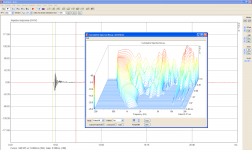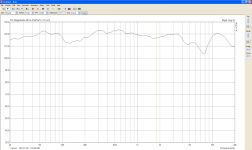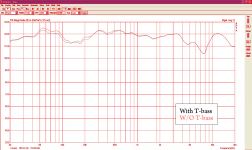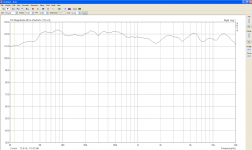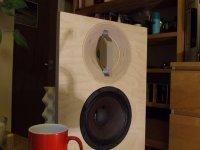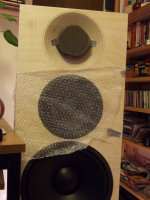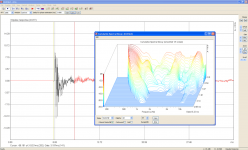Gating is possible in the Impulse and Step Response windows. If you move the cursor over the response window and push the left button, you get a yellow vertical line under the cursor, which can be moved horizontally while the button is kept down. Move the yellow line to the start of the gate.I'm not sure how I change the gating as I don't see that terminology used in the options so far.
Same for the right mouse button, which produces a red line. Move that line to the end of the gate.
Usually you want the yellow line just left from the onset of the impulse and the red line just left from the first reflection.
Here's the on-axis response with the new crossover. It's quite a bit smoother than the one I managed by ear but probably still needs a lot of work.
In truth I think it looks better than it really is because of the massive scale. I'll keep using this scale for the sake of familiarity and before/after comparisons though.
In truth I think it looks better than it really is because of the massive scale. I'll keep using this scale for the sake of familiarity and before/after comparisons though.
Attachments
You need to gate the response to remove effect of room reflections, etc. Its basically choosing a window of time to measure the response.
Go to nutshellhifi and check out the mlssa gallery. Lynn Olson does an excellent job of explaining how to gate the impulse response. In your graph, I can see the gate starting just after the impulse peak (in the CSD graph). I cannot see where it ends.
Download Holmimpulse, it has a great impulse response gating feature. Very handy and very easy to use. Also, there is an application note on ARTA's website which explains how to combine nearfield and farfield responses.
I wish there was an easier way to learn this, but these some of the references I read while learning to make measurements 🙂
Go to nutshellhifi and check out the mlssa gallery. Lynn Olson does an excellent job of explaining how to gate the impulse response. In your graph, I can see the gate starting just after the impulse peak (in the CSD graph). I cannot see where it ends.
Download Holmimpulse, it has a great impulse response gating feature. Very handy and very easy to use. Also, there is an application note on ARTA's website which explains how to combine nearfield and farfield responses.
I wish there was an easier way to learn this, but these some of the references I read while learning to make measurements 🙂
In ARTA the gate starts at the yellow line and ends at the red line. I believe Simon did a really good job at setting his first window. 😉In your graph, I can see the gate starting just after the impulse peak (in the CSD graph). I cannot see where it ends.
Thanks 🙂
Just a shame the response is a bit of a state. I'm looking on nutshellhifi now. Interesting how people are using such ancient gear because it feels right and gives good results.
I did some tests with and without T-bass. It clearly wasn't doing what I thought it was, but it is improving the response a little. I think it needs tweaking.
Just a shame the response is a bit of a state. I'm looking on nutshellhifi now. Interesting how people are using such ancient gear because it feels right and gives good results.
I did some tests with and without T-bass. It clearly wasn't doing what I thought it was, but it is improving the response a little. I think it needs tweaking.
Attachments
Last edited:
Not yet but I have a feeling I should! Only issue is the T bass makes the wiring job a bit more complicated. Maybe it's the mid that needs reversing, I will try.
Yup, the result is similar to what I've experienced with regard to wiring the mid and woofer out of phase. That is a spectacular response you are 'starting' with. Can only get better from here.
Can you post pics of the foam thingy you are doing?
Can you post pics of the foam thingy you are doing?
It looks better than it is because of the 100dB range/scale I think, but it's really great to be moving forwards so much in one (very busy) day.
The foam is a false victory because it's only good on-axis, but off-axis it's a bit top heavy. I need to find some more suitable foam!!
The foam is a false victory because it's only good on-axis, but off-axis it's a bit top heavy. I need to find some more suitable foam!!
Attachments
For a reality check I fired up the other speaker, and it sounds thin and nasal in the midrange by comparison. It also sounds closed-in. Progress..
Test music for today: Fairground Attraction - First of a Million Kisses 😀
* on a side-note I seem to have lost some deep/mid bass since changing the midrange phase. Funny that it would subtract down there and combine further up the bass range.
Test music for today: Fairground Attraction - First of a Million Kisses 😀
* on a side-note I seem to have lost some deep/mid bass since changing the midrange phase. Funny that it would subtract down there and combine further up the bass range.
Last edited:
I've been in the attic and found a bigger piece of foam, quite thick and large enough a sheet to be useful. With two discs in front of the tweeter the graph gets quite smooth and flat and the sound becomes superb! This is a world apart from the sound I had this morning. Everything is so relaxed and open and clear! Fleetwood Mac sounds amazing on just the one speaker 😀
Apologise for the monologue today. Here's a pic of the new foam test discs. You'll also see an experiment involving bubble-wrap as recommended by Audiojoy in his OB build thread: http://www.diyaudio.com/forums/multi-way/142186-my-first-open-baffle-speaker.html
Hi Simon... Congratulatios on the evolutions !
I am glad I started reading your thread..... most informative as ususal 🙂
I am glad I started reading your thread..... most informative as ususal 🙂
We're getting somewhere Ricardo! A schematic will follow tomorrow detailing the changes (almost every area has changed today).
Here's the pic I tried to attach earlier, and an up-to-date CSD plot. I don't know if I've gated it right etc. but it's still quite interesting I think.
Here's the pic I tried to attach earlier, and an up-to-date CSD plot. I don't know if I've gated it right etc. but it's still quite interesting I think.
Attachments
Since you have the driver, and the setup, can you do a CSD of the Beta 8A alone? From the spec sheet, it gets a little peaky beyond 1k. It looks like a very promising driver for the midrange.
Any comments on sound?
Any comments on sound?
CLS - the progress is entirely owing to the accumulated forum knowledge and help. I'd never have made a good speaker without all the great people on here.
ra7 - I will surely do the CSD you ask for, just don't read too much into it because I'm measuring in a tiny room (my bedroom) and probably haven't optimised the settings either. That said, the mic capsule and pre-amp are definitely decent and I've got the capsule almost hanging in the air so it's probably not too bad with reflections.
The sound of the speakers as a whole (I got the left speaker up to scratch late last night) is wonderful in my opinion. I just listened to most of Bad (Michael Jackson) and found the bass full, firm, hard-hitting and exceptionally tight (I'm sure no boxed speaker could do that in this room). The top end is pretty decent, it actually sounds fairly clean and smooth now, and it integrated well with the midrange. The mids coming from the Beta 8a are great, they're no longer peaky and nasal/cuppy as they began. Vocals are sweet but not falsely sugared and intelligibility of vocals is (from listening so far) excellent. I clearly heard words on Bad that I'd not knowingly deciphered before. It was very apparent and very relaxed. The ears do not close up, even at very high volumes.
I am listening using Marantz MA-500 power amps (modified), Pedja Rogic buffer as preamp, and an Arcam Alpha CD player (completely modified 2-boxer with HUGE power supplies). I think the rest of the system is in decent shape, which I personally think is vital.
ra7 - I will surely do the CSD you ask for, just don't read too much into it because I'm measuring in a tiny room (my bedroom) and probably haven't optimised the settings either. That said, the mic capsule and pre-amp are definitely decent and I've got the capsule almost hanging in the air so it's probably not too bad with reflections.
The sound of the speakers as a whole (I got the left speaker up to scratch late last night) is wonderful in my opinion. I just listened to most of Bad (Michael Jackson) and found the bass full, firm, hard-hitting and exceptionally tight (I'm sure no boxed speaker could do that in this room). The top end is pretty decent, it actually sounds fairly clean and smooth now, and it integrated well with the midrange. The mids coming from the Beta 8a are great, they're no longer peaky and nasal/cuppy as they began. Vocals are sweet but not falsely sugared and intelligibility of vocals is (from listening so far) excellent. I clearly heard words on Bad that I'd not knowingly deciphered before. It was very apparent and very relaxed. The ears do not close up, even at very high volumes.
I am listening using Marantz MA-500 power amps (modified), Pedja Rogic buffer as preamp, and an Arcam Alpha CD player (completely modified 2-boxer with HUGE power supplies). I think the rest of the system is in decent shape, which I personally think is vital.
- Status
- Not open for further replies.
- Home
- Loudspeakers
- Multi-Way
- 3 way open baffle with Eminence and Skytronic
